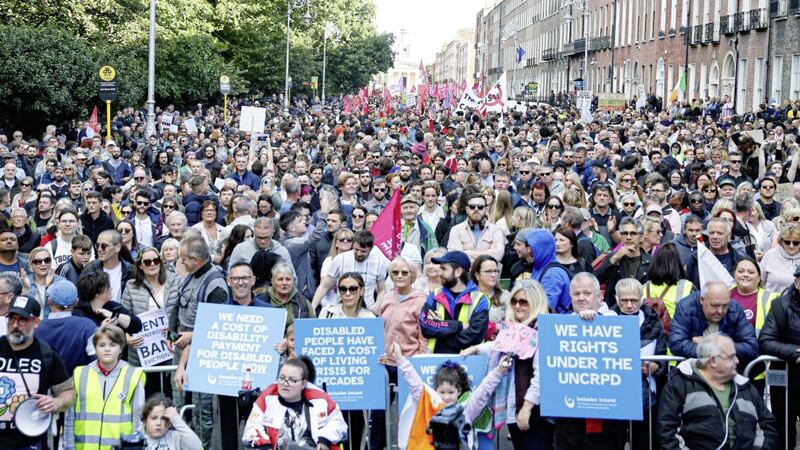IT FELT like the radical days of old in downtown Dublin last weekend.
There were rousing speeches from a platform, eagerly applauded by thousands of listeners. Banners fluttered in the September air and placards were held aloft carrying anti-government slogans. The audience cheered loudly whenever a speaker hit the right note, which was every couple of minutes. I even spotted a red flag that carried the face of Ernesto “Che” Guevara (1928-67), revolutionary descendant of Galwayman Patrick Lynch who emigrated to Latin America in 1749. According to the Hollywood legend and native of Dublin, Maureen O’Hara, who had numerous conversations in Cuba with him during the filming of ‘Our Man in Havana’, Che had a comprehensive knowledge of “every battle in Ireland and all of its history”. I wish I’d known that when I met her at lunch many years later here in Ireland, although she had some interesting memories of John Wayne, her co-star in’ ‘The Quiet Man’, as well as the director of that movie, John Ford.
The protest by the Cost of Living Coalition of over 30 organisations started on the northside of the city on Saturday afternoon and made its way across the Liffey to Merrion Square South. A mass rally took place a short distance from the back gate of Leinster House where several gardaí on horseback were stationed, presumably in case protesters tried to re-enact the storming of the Winter Palace in Russia in 1917.
The crowd gathered across the way, beside a house where the poet WB Yeats took up residence exactly a century beforehand in 1922. I wondered, if he was looking out the window, would it have inspired a poetic line? This was the man who wrote, after the 1916 Rising, that “A terrible beauty is born”, but since this rally was all about the impending budget, something like his ‘September 1913’ poem, published during the major industrial dispute known as the Dublin Lock-out, might have been more appropriate. His line about adding “the half-pence to the pence” would have reflected last Saturday’s radical perspective on the government’s approach. Further down the same block is a house where Daniel O’Connell once lived: a politician who also liked holding mass rallies in his day.
Speaking ahead of the budget due to be announced the following Tuesday, Sinn Féin president Mary Lou McDonald said: “This cost of living crisis shows again the huge inequalities that exist in Ireland. It shows how Ireland works under parties that have governed now for more than a century.”
Describing the planned switchover from Micheál Martin to Leo Varadkar as taoiseach in mid-December as “a joke”, she continued: “We need much more than a change of taoiseach, we need a change of government.”
As she neared the end of her speech, the Sinn Féin leader and would-be taoiseach told her listeners: “Change is coming for you, change is coming because of you. We will not settle for second-best or second-class citizenship, or anyone left behind: ever, ever, ever again!”
Nothing much in politics can be taken for granted, but Mary Lou McDonald may well achieve her ambition to head-up a Sinn Féin-led government. Judging from current opinion polls, it looks as if her party will win the largest number of seats in the next general election but fall short of an overall majority. It also seems unlikely that the three parties who form the current ruling coalition will have enough members in the next Dáil Éireann to form a government. We could see a bidding-war between them and Sinn Féin to attract support from smaller parties and independents. Another possibility is that Fianna Fáil, perhaps under a new leader at that stage, might be interested in going into government with Mary Lou in a new, two-party coalition. Whether the Sinn Féin leader, who started out her party-political journey as a Fianna Fáil member, would be open to such an alliance is another question.
There is a Chinese saying that goes: “May you live in interesting times.” It is generally regarded as a curse and that may well be the case as regards politicians but, for journalists and everyone else watching from the sidelines, such times can be quite entertaining. There might well be elements in Sinn Féin who would prefer an alliance with the smaller parties on the left, because of Fianna Fáil’s more conservative record. Whatever might be agreed on will of course need to secure the necessary numbers. It’s all to play for, folks: don’t take anything for granted.
Email: Ddebre1@aol.com; Twitter: @DdeBreadun








